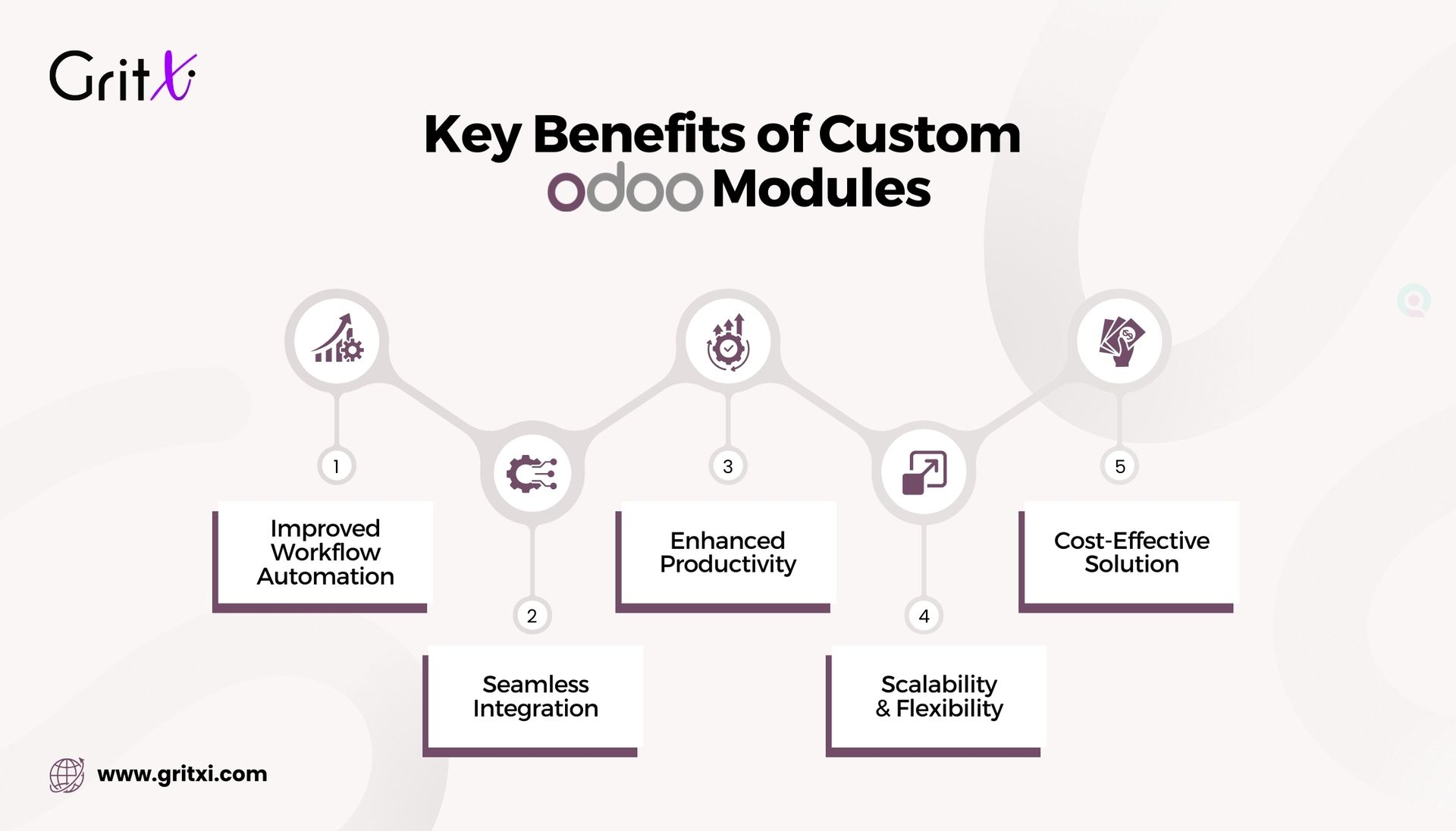In today’s fast-paced business environment, efficiency and automation are crucial to maintaining a competitive edge. Many businesses rely on Enterprise Resource Planning (ERP) systems to manage their operations, and Odoo has emerged as one of the most powerful and flexible ERP solutions available. However, while Odoo’s standard modules cover a wide range of functionalities, every business has unique requirements that off-the-shelf solutions cannot always meet.
This is where custom Odoo modules come into play. By tailoring Odoo to specific business needs, companies can optimize their workflows, improve productivity, and gain a significant competitive advantage. In this blog, we’ll explore why businesses should invest in custom Odoo modules, their benefits, and how to implement them effectively.
Why Choose Custom Odoo Modules?
1. Overcoming Standard Limitations
Odoo offers a wide range of pre-built modules for finance, sales, inventory, HR, and more. However, these modules follow a one-size-fits-all approach, which might not align perfectly with your business’s workflow. Custom Odoo modules allow you to modify existing features or add new functionalities tailored to your needs.
2. Adapting to Business-Specific Needs
Different industries have unique operational challenges. Whether you are in retail, manufacturing, logistics, or healthcare, customization ensures that Odoo fits seamlessly into your business model. For instance, a logistics company might need advanced route optimization features, while an eCommerce business could require a unique pricing strategy module.
3. Enhancing User Experience
Standard ERP systems often come with unnecessary features that complicate usage. Customization ensures that your Odoo interface remains clean and user-friendly, allowing employees to navigate and execute tasks more efficiently.

Key Benefits of Custom Odoo Modules
1. Improved Workflow Automation
Manual tasks can slow down operations and increase the risk of human error. With custom Odoo modules, businesses can automate repetitive processes such as invoicing, report generation, and inventory tracking. This results in faster and more accurate operations.
2. Seamless Integration
A business may rely on multiple software applications, such as CRM tools, accounting systems, and third-party APIs. Custom Odoo modules enable seamless integration with these applications, ensuring smooth data flow and better operational efficiency.
3. Enhanced Productivity
By eliminating redundant tasks and providing role-specific dashboards, custom modules help employees focus on more strategic activities. This boosts overall productivity and allows businesses to achieve more in less time.
4. Scalability & Flexibility
As businesses grow, their needs evolve. Custom modules provide the flexibility to scale up and add new functionalities as required. Unlike rigid ERP systems, Odoo’s modular nature allows businesses to modify their software effortlessly.
5. Cost-Effective Solution
While developing custom modules may require an initial investment, they help reduce long-term operational costs by optimizing workflows and eliminating inefficiencies. This results in better ROI compared to using standard software with multiple workarounds.
How to Develop Custom Odoo Modules for Your Business
1. Identify Business Requirements
Start by analyzing your current processes and identifying areas where automation or customization can enhance efficiency. Engage with different departments to understand their pain points and gather input on the necessary features.
2. Choose the Right Odoo Development Partner
Working with an experienced Odoo developer or service provider ensures that your customization is implemented correctly. Look for a partner with a strong portfolio in Odoo customization and ERP development.
3. Define Scope and Features
Once you have a development partner, outline the scope of the project, specifying the required features and functionalities. This step is crucial in preventing scope creep and ensuring that the final product aligns with your needs.
4. Develop and Test the Custom Module
After finalizing the requirements, the development team will build the module. It is essential to conduct rigorous testing to identify and resolve any bugs before deploying it in the live environment.
5. Deploy and Train Employees
Once the module is deployed, provide training to employees on how to use it effectively. Clear documentation and support ensure smooth adoption and maximum utilization.
Industries Benefiting from Custom Odoo Modules
Retail & eCommerce
Custom pricing strategies
Advanced inventory management
AI-driven customer recommendations
Manufacturing
Production planning and scheduling
Real-time monitoring of manufacturing processes
Quality control automation
Logistics & Supply Chain
Route optimization
Automated freight cost calculation
Advanced shipment tracking
Healthcare
Patient management systems
Appointment scheduling
Electronic health records integration
Finance & Accounting
Custom financial reporting
Automated invoicing and tax calculations
Compliance tracking
Common Challenges & How to Overcome Them
1. Ensuring Compatibility with Existing Systems
Custom modules should integrate seamlessly with existing Odoo functionalities and third-party applications. Choosing an experienced development team can help ensure compatibility.
2. Managing Data Security and Compliance
Handling sensitive business data requires stringent security measures. Implementing role-based access, encryption, and regular audits helps protect data integrity.
3. Keeping Up with Odoo Version Updates
Odoo frequently releases updates with new features and improvements. Custom modules should be developed with scalability in mind to ensure they remain compatible with future Odoo versions.
Conclusion
Custom Odoo modules are a game-changer for businesses looking to optimize their workflows and enhance productivity. By tailoring Odoo to specific needs, companies can streamline processes, integrate seamlessly with other tools, and achieve better efficiency.
If you’re looking to take your business operations to the next level, investing in custom Odoo modules is a smart choice. Whether you need automation, advanced reporting, or a personalized interface, Odoo’s flexibility allows you to create a system that perfectly aligns with your business goals.
Looking to get started with custom Odoo development? Connect with an Odoo expert today and unlock your business’s full potential!
Transform Your Workflow with Custom Odoo Modules